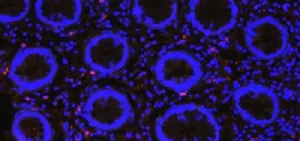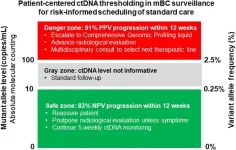(Press-News.org) LA JOLLA, CA—Children who experience multiple cases of dengue virus develop an army of dengue-fighting T cells, according to a new study led by scientists at La Jolla Institute for Immunology (LJI).
The findings, published recently in JCI Insights, suggest that these T cells are key to dengue virus immunity. In fact, most children who experienced two or more dengue infections showed very minor symptoms—or no symptoms at all—when they caught the virus again.
"We saw a significant T cell response in children who had been infected more than once before," says study leader and LJI Assistant Professor Daniela Weiskopf, Ph.D.
Dengue virus infects up to 400 million people each year, and there are few vaccines and no approved therapies available for any of the four species, or "serotypes," of the virus. The researchers hope their findings can inform the development of a dengue virus vaccine that prompts a similarly strong T cell response.
This research comes as dengue-carrying mosquitos expand their territory into new regions, including Southern California. Health officials in California reported the state's first-ever case of locally acquired dengue virus in 2023. Since then, Los Angeles County has reported 12 additional cases of locally acquired dengue virus, and San Diego County has confirmed two locally acquired cases.
"Dengue virus is expanding into areas where the majority of people have never seen the virus," says Weiskopf, who is a member of LJI's Center for Vaccine Innovation. "That will change the game."
T cells help fight dengue
Weiskopf and her colleagues set out to understand how T cells might sway the severity of dengue virus infection. Are T cells helping or hurting young patients?
After all, the immune system has to strike a careful balance when fighting viruses. A weak T cell response makes it tough to fight infection. On the other hand, an overzealous T cell response can cause harmful inflammation and potentially fatal complications.
The researchers studied a group of 71 children in Managua, Nicaragua, a region where dengue virus is endemic. Since 2004, study co-author Eva Harris, Ph.D., Director of the Center for Global Public Health at UC Berkeley, has worked with Nicaraguan scientists to study dengue infections in this patient group.
These children, ages 2 to 17, come in for regular blood draws to test for antibodies against dengue virus. By detecting a rise in these antibodies, compared to the previous year, researchers can tell if a child has dealt with a past dengue virus infection. Importantly, researchers can also use the blood test to catch inapparent cases of dengue infection—where a child has been exposed to the virus but is showing no clinical symptoms.
The researchers found that the number of dengue-fighting T cells in these children builds up with each infection, and these T cells appeared to be helping the pediatric patients.
Children with a history of two or more dengue infections were much less likely to show clinical symptoms if they caught the virus again. Meanwhile, children only infected once were more likely to show clinical symptoms of disease during a later infection.
Next steps toward a life-saving vaccine
The new study may offer context for why a recent dengue virus vaccine, called Dengvaxia, appeared safe and effective in just a subset of patients at risk for dengue infection. The vaccine was only FDA-approved for children who were ages 9 to 16—and lived in a dengue-endemic area, assuming that they have experienced dengue infection by that age. Subsequent licensure in other countries required an antigen test to prove previous exposure.
The vaccine didn't work if a person hadn't been exposed to dengue virus before. Could it be that their T cells weren't ready to jump into action?
As the new study suggests, it may take multiple dengue virus exposures to gain immunity. Weiskopf says scientists will continue to investigate how to harness T cells to fight dengue virus.
"There's a lot more work to be done," says Weiskopf.
Additional authors of the study, "Frequency of Dengue Virus-Specific T Cells is related to Infection Outcome in Endemic Settings," include Rosa Isela Gálvez, Amparo Martínez-Pérez, E. Alexandar Escarrega, Tulika Singh,José Víctor Zambrana, and Ángel Balmaseda.
This study was supported by the National Institute of Allergy and Infectious Diseases/National Institutes of Health (grant P01 AI106695.)
DOI: 10.1172/jci.insight.179771
END
As dengue spreads, researchers discover a clue to fighting the virus
LJI scientists find protective T cells in children who experience two or more dengue virus infections
2025-02-24
ELSE PRESS RELEASES FROM THIS DATE:
Teaming up tiny robot swimmers to transform medicine
2025-02-24
Smart artificial microswimmers—small robots that resemble microorganisms like bacteria or human sperm—could potentially be used for targeted drug delivery, minimally invasive surgery, and even in fertility treatments.
These types of complicated tasks won’t be accomplished by a single microswimmer. Multiple swimmers will be necessary; however, it’s unclear how such groups will move within the chemically and mechanically complex environment of the body’s fluids.
“We know that whenever a swimmer has a neighbor, it swims differently,” says Ebru Demir, an assistant ...
The Center for Open Science welcomes Daniel Correa and Amanda Kay Montoya to its Board of Directors
2025-02-24
(Charlottesville, VA, Feb. 24, 2025) –
The Center for Open Science (COS) is pleased to announce the appointment of Daniel Correa, Chief Executive Officer of the Federation of American Scientists, and Amanda Montoya, Associate Professor of Quantitative Psychology at UCLA, to the COS Board of Directors. Both will serve three-year terms from 2025 to 2027, bringing valuable expertise in science policy, innovation, research methodology, and open science advocacy.
Daniel Correa is the Chief Executive Officer of the Federation of American Scientists, ...
Research suggests common viral infection worsens deadly condition among premature babies
2025-02-24
FOR IMMEDIATE RELEASE
Researchers say they found that infection with a common virus that can be transmitted from mother to fetus before birth significantly worsens an often-fatal complication of premature birth called necrotizing enterocolitis (NEC) in experiments with mice.
The research team, led by Johns Hopkins Children’s Center investigators and funded by the National Institutes of Health, says the new findings advance the search for better treatments for NEC — a relatively rare condition, but still the most common emergency intestinal complication in preemies.
A report on the study published Feb. 13 in Cellular and Molecular Gastroenterology ...
UC Irvine scientists invent new drug candidates to treat antibiotic-resistant bacteria
2025-02-24
Irvine, Calif., Feb. 24, 2025 — There’s an arms race in medicine – scientists design drugs to treat lethal bacterial infections, but bacteria can evolve defenses to those drugs, sending the researchers back to square one. In the Journal of the American Chemical Society, a University of California, Irvine-led team describes the development of a drug candidate that can stop bacteria before they have a chance to cause harm.
“The issue with antibiotics is this crisis of antibiotic ...
A history of isolation and alcohol use may impact depression treatment
2025-02-24
Ketamine can effectively treat depression, but whether depressed patients with alcohol use disorder can safely use ketamine repeatedly remains unclear clinically. To investigate this possibility, Mohamed Kabbaj and colleagues from Florida State University modeled aspects of human depression in rats using long-term isolation and assessed how isolation and alcohol exposure alter ketamine intake. The authors found that a history of isolation and alcohol use influence the rewarding properties of ketamine in a sex-dependent manner.
Female rats took ketamine more than males in general. Prior alcohol use increased female rat ketamine ...
A new strategy to promote healthy food choices
2025-02-24
Poor food decisions and eating habits can contribute to excessive weight gain and health problems. Nutritional labels meant to convey healthiness instead may create negative expectations about taste or pose as a time-constraining hurdle for shoppers. Doris Schicker and Jessica Freiherr, from the Fraunhofer Institute for Process Engineering and Packaging, led a study in JNeurosci to explore whether pairing food labels with a sensory stimulus, like odor, affects how people perceive foods and thus promotes healthy shopping. ...
Report reveals high levels of added sugar in US infant formula despite medical recommendations
2025-02-24
LAWRENCE — Added sugar, derived from cheap crops like corn, is bad for babies.
According to the American Heart Association, added sugars are full of energy but lack nutritional value, boosting odds of obesity, type 2 diabetes, cardiovascular disease and other health problems.
But a study published today from the University of Kansas in the Journal of Food Composition and Analysis shows most infant formulas on the U.S. market contain primarily added sugars rather than the healthier, naturally occurring lactose found in cow-milk base that would be best for babies because ...
Arctic study urges stronger climate action to prevent catastrophic warming
2025-02-24
Remember when 2°C of global warming was the doomsday scenario? Well, we're now staring down the barrel of something much worse. From the fish on your plate to the weather outside your window, everything's about to change.
A new study by an international team of researchers, including Jackie Dawson, full professor, Geography, Environment and Geomatics at the University of Ottawa’s Faculty of Arts, underscores the grave risks posed by insufficient national commitments to reducing greenhouse gas emissions.
“Our findings ...
New technique to measure circulating tumor DNA in metastatic cancer may improve disease progression surveillance and patient outcomes
2025-02-24
Philadelphia, February 24, 2025 – In metastatic cancer surveillance, monitoring the actual concentrations of circulating tumor DNA (ctDNA) may be critical. Researchers showed that absolute ctDNA concentration thresholds can be defined to rule out or predict impending cancer progression. They introduce a dual threshold model in a novel study in The Journal of Molecular Diagnostics, published by Elsevier, that may improve cancer surveillance, patient stratification, and risk-informed, personalized treatment by providing more accurate and timely assessment of disease progression.
Lead ...
One day of sleep deprivation can alter your immune system and increase inflammation
2025-02-24
New research reveals insight into the impact sleep quality has on a person’s immune system, and how it could be linked to the development of diseases such as obesity, diabetes, and cardiovascular diseases.
The study, published in The Journal of Immunology, found that even a single night of 24-hour sleep deprivation in young, lean, and healthy individuals altered the profile of immune cells that help regulate the immune system to resemble that of individuals with obesity - a condition known to drive chronic inflammation. This suggests that the immune system is highly sensitive to sleep and may adapt rapidly to changes in sleep pattern. ...
LAST 30 PRESS RELEASES:
Novel camel antimicrobial peptides show promise against drug-resistant bacteria
Scientists discover why we know when to stop scratching an itch
A hidden reason inner ear cells die – and what it means for preventing hearing loss
Researchers discover how tuberculosis bacteria use a “stealth” mechanism to evade the immune system
New microscopy technique lets scientists see cells in unprecedented detail and color
Sometimes less is more: Scientists rethink how to pack medicine into tiny delivery capsules
Scientists build low-cost microscope to study living cells in zero gravity
The Biophysical Journal names Denis V. Titov the 2025 Paper of the Year-Early Career Investigator awardee
Scientists show how your body senses cold—and why menthol feels cool
Scientists deliver new molecule for getting DNA into cells
Study reveals insights about brain regions linked to OCD, informing potential treatments
Does ocean saltiness influence El Niño?
2026 Young Investigators: ONR celebrates new talent tackling warfighter challenges
Genetics help explain who gets the ‘telltale tingle’ from music, art and literature
Many Americans misunderstand medical aid in dying laws
Researchers publish landmark infectious disease study in ‘Science’
New NSF award supports innovative role-playing game approach to strengthening research security in academia
Kumar named to ACMA Emerging Leaders Program for 2026
AI language models could transform aquatic environmental risk assessment
New isotope tools reveal hidden pathways reshaping the global nitrogen cycle
Study reveals how antibiotic structure controls removal from water using biochar
Why chronic pain lasts longer in women: Immune cells offer clues
Toxic exposure creates epigenetic disease risk over 20 generations
More time spent on social media linked to steroid use intentions among boys and men
New study suggests a “kick it while it’s down” approach to cancer treatment could improve cure rates
Milken Institute, Ann Theodore Foundation launch new grant to support clinical trial for potential sarcoidosis treatment
New strategies boost effectiveness of CAR-NK therapy against cancer
Study: Adolescent cannabis use linked to doubling risk of psychotic and bipolar disorders
Invisible harms: drug-related deaths spike after hurricanes and tropical storms
Adolescent cannabis use and risk of psychotic, bipolar, depressive, and anxiety disorders
[Press-News.org] As dengue spreads, researchers discover a clue to fighting the virusLJI scientists find protective T cells in children who experience two or more dengue virus infections





